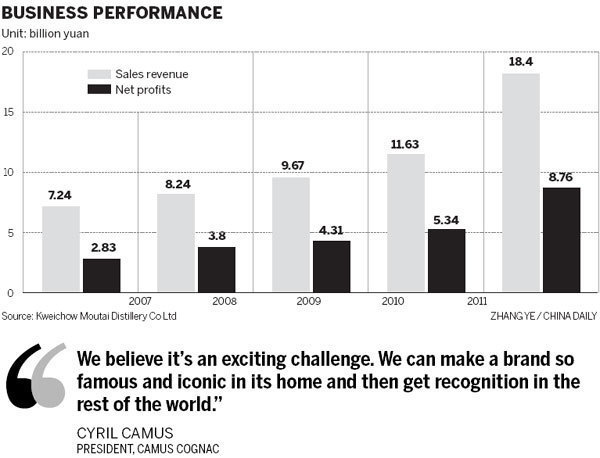
Brand image
These efforts to promote Moutai worked during 2009 and 2010. A few stores started to do well and others began to hear about them, raising confidence in the liquor. Starting from Asia, Moutai went to Europe and the United States, where duty-free trade and operators were willing to sell the product.
"We believe it's an exciting challenge. We can make a brand so famous and iconic in its home and then get recognition in the rest of the world," said Camus.
Ji of Kweichow Moutai admitted that sales of Moutai outside China are still limited. He attributed it to differences in drinking habits and the fact that there is a greater choice of alcoholic strengths and flavors in other countries.
Yang Jun, corporate manager of a State-owned enterprise, told China Daily that he once bought two bottles of Small Batch Blend Moutai in a duty-free shop at Beijing Capital International Airport. It cost $135 for a 350 milliliter bottle. "They are for my friends in Germany. For myself, I will not buy the liquor in duty-free shops," said Yang, explaining that the taste of Small Batch Blend Moutai is lighter than that sold in the domestic market and not very typical. "Maybe Moutai adjusts the formula to cater to Westerners' tastes?" he suggested.
According to an assistant in the shop, some visitors bought Small Batch Blend Moutai but few of them were foreigners. "More Chinese travelers bought Maotai for an investment. In recent years, the retail price of the liquor has increased 400 to 600 percent. They believe the price will continue to rise," she said.
Kweichow Moutai plans to increase its output to about 100,000 tons this year from 60,000 tons in 2011, Ji said. The company generated sales revenues of 18.4 billion yuan ($2.92 billion) in 2011, a year-on-year increase of 58.19 percent. Meanwhile, its net profit jumped 73.49 percent to 8.76 billion yuan. Analysts attributed the higher growth of net profit mainly to continuous price rises.
Although in the international market the manufacturer and sellers are making efforts to highlight Moutai's status as a premium brand, the company is striving to emphasize Moutai is not a luxury good and to disassociate the liquor's relationship with corruption and banquets and receptions held at public expense.
Liu Yuan, secretary-general of the China National Association for Liquor and Spirits Circulation, said that Moutai is an icon of China's white spirit industry selected by high-end customers. "What we should criticize is corruption and public budget consumption, not Moutai."

Competition
A group of other Chinese liquor producers are also trying to enter the international market and some foreign agencies are doing their best to promote them overseas.
International drink trader Diageo Highland Holding BV is to launch a mandatory tender offer to all shareholders of Sichuan Swellfun Co, excluding its parent company Sichuan Quanxing Group, at 21.45 yuan a share.
Diageo Highland is currently a foreign shareholder of Quanxing, with a 53 percent stake, and the controlling shareholder of Swellfun by indirectly owning nearly 40 percent of the brand.
If all other shareholders of Swellfun accept the offer, Diageo Highland will buy out the remaining 60 percent stake for a maximum amount of 6.3 billion yuan, giving the company full ownership of the brand.
"The offer shows foreign companies' interest in Chinese liquor and it will help Swellfun to enter the international market," said Liu.
Founded in 2000, Swellfun is one of the premium liquor brands in China. It competes with Kweichow Moutai and Wuliangye of Wuliangye Yibin Co. Diageo Highland is a subsidiary of the London-based spirit giant Diageo, producer of Johnnie Walker whisky and Smirnoff vodka.
Camus said he thinks that although the acquisition will bring competition to his business, it is a good thing. "More competitors will help more Westerners to get an appreciation of baijiu - the specific category of liquors from China," he said.